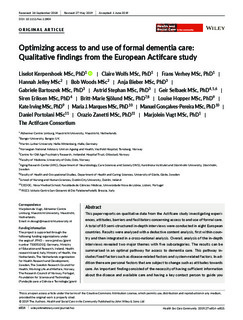| dc.contributor.author | Kerpershoek, Liselot | |
| dc.contributor.author | Wolfs, Claire | |
| dc.contributor.author | Verhey, Frans | |
| dc.contributor.author | Jelley, Hannah | |
| dc.contributor.author | Woods, Bob | |
| dc.contributor.author | Bieber, Anja | |
| dc.contributor.author | Bartoszek, Gabriele | |
| dc.contributor.author | Stephan, Astrid | |
| dc.contributor.author | Selbæk, Geir | |
| dc.contributor.author | Eriksen, Siren | |
| dc.contributor.author | Sjölund, Britt-Marie | |
| dc.contributor.author | Hopper, Louise | |
| dc.contributor.author | Irving, Kate | |
| dc.contributor.author | Goncalves-Pereira, Manuel | |
| dc.contributor.author | Portolani, Daniel | |
| dc.contributor.author | Zanetti, Orazio | |
| dc.contributor.author | Vugt, Marjolein | |
| dc.coverage.spatial | Norway | nb_NO |
| dc.date.accessioned | 2019-12-20T09:57:28Z | |
| dc.date.available | 2019-12-20T09:57:28Z | |
| dc.date.created | 2019-07-15T13:17:18Z | |
| dc.date.issued | 2019 | |
| dc.identifier.citation | Kerpershoek L, Wolfs C, Verhey F, et al; The Actifcare Consortium. Optimizing access to and use of formal dementia care: Qualitative findings from the European Actifcare study. Health Soc Care Community. 2019;27:e814–e823. https://doi.org/10.1111/hsc.12804 | nb_NO |
| dc.identifier.issn | 0966-0410 | |
| dc.identifier.uri | http://hdl.handle.net/11250/2634251 | |
| dc.description.abstract | This paper reports on qualitative data from the Actifcare study investigating experiences, attitudes, barriers and facilitators concerning access to and use of formal care. A total of 85 semi-structured in-depth interviews were conducted in eight European countries. Results were analysed with a deductive content analysis, first within country and then integrated in a cross-national analysis. Overall, analysis of the in-depth interviews revealed two major themes with five subcategories. The results can be summarised in an optimal pathway for access to dementia care. This pathway includes fixed factors such as disease-related factors and system-related factors. In addition there are personal factors that are subject to change such as attitudes towards care. An important finding consisted of the necessity of having sufficient information about the disease and available care and having a key contact person to guide you through the process of finding suitable care while monitoring your needs. In addition, it is important to involve your social network as they can take on care-giving tasks. It is helpful to have a diagnosis (in most countries). Concerning decision-making, the person closest to the person with dementia is in the majority of cases the one who makes the ultimate decision to access and use services and he/she should therefore be supported in this process. These results provide insight into the factors that influence the pathway to formal care use and help professionals to enhance access to formal dementia care by focusing on factors that can be modified. | nb_NO |
| dc.description.sponsorship | The project is supported through the following funding organizations under the aegis of JPND – www.jpnd.eu [grant number 733051001]. Germany, Ministry of Education and Research, Ireland, Health research board, Italy, Ministry of Health, the Netherlands, The Netherlands organization for Health Research and Development, Sweden, The Swedish Research Council for Health, Working Life and Welfare, Norway, The Research Council of Norway, Portugal, Foundation for Science and Technology (Fundação para a Ciência e Tecnologia [grant number FCT–JPND‐HC/ 0001/2012], United Kingdom, Economic and Social Research Council. JPND has read and approved of the protocol of the Actifcare study | nb_NO |
| dc.language.iso | eng | nb_NO |
| dc.publisher | John Wiley & Sons Ltd. | nb_NO |
| dc.relation.uri | https://onlinelibrary.wiley.com/doi/epdf/10.1111/hsc.12804 | |
| dc.rights | Navngivelse 4.0 Internasjonal | * |
| dc.rights.uri | http://creativecommons.org/licenses/by/4.0/deed.no | * |
| dc.subject | access to care; dementia; in-depth interviews; informal care; service use | nb_NO |
| dc.title | Optimizing access to and use of formal dementia care: Qualitative findings from the European Actifcare study | nb_NO |
| dc.type | Journal article | nb_NO |
| dc.type | Peer reviewed | nb_NO |
| dc.description.version | publishedVersion | nb_NO |
| dc.rights.holder | © 2019 The Authors. This is an open access article under the terms of the Creative Commons Attribution License, which permits use, distribution and reproduction in any medium, provided the original work is properly cited. | nb_NO |
| dc.source.pagenumber | 10 | nb_NO |
| dc.source.volume | 27 | nb_NO |
| dc.source.journal | Health and Social Care in the community | nb_NO |
| dc.source.issue | 5 | nb_NO |
| dc.identifier.doi | 10.1111/hsc.12804 | |
| dc.identifier.cristin | 1711511 | |
| cristin.unitcode | 1991,9,1,0 | |
| cristin.unitname | Avd Alderspsykiatri | |
| cristin.ispublished | true | |
| cristin.fulltext | original | |
| cristin.qualitycode | 1 | |

